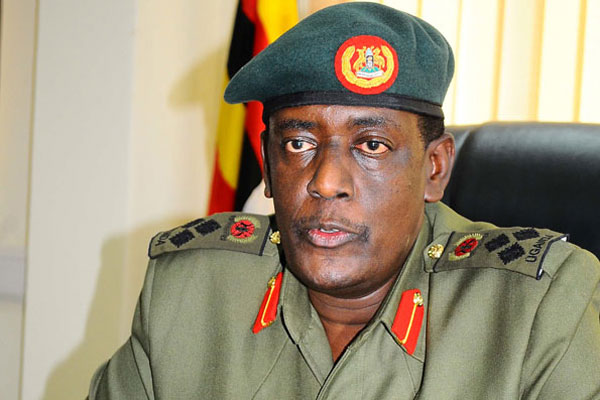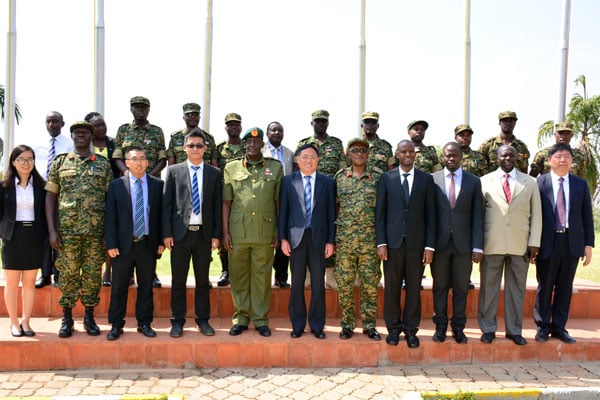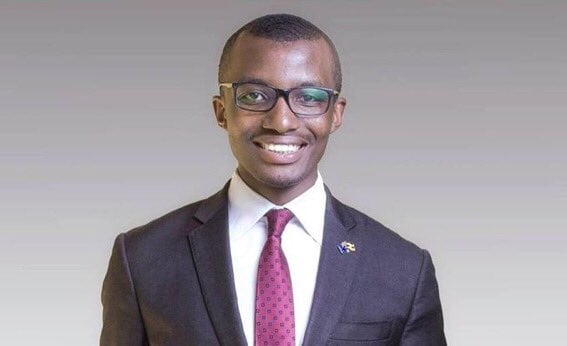Prime
Questions as army move to private security deals

This photomontagae created on July 17, 2023 shows UPDF chief Gen Wilson Mbadi, President Museveni and NEC Managing Director Lt Gen James Mugira. PHOTO/COMBO
What you need to know:
- The National Enterprise Corporation, UPDF’s commercial arm, says it has started a private security firm to make money.
A move by the commercial arm of the Uganda People’s Defence Forces (UPDF) to draft men and women as private security providers has drawn mixed reactions, with the Opposition questioning the legal basis.
The National Enterprise Corporation, or NEC, established by an Act of Parliament in March 1989, last Friday in Nakasongola District passed out 98 trainees as its pioneer members of the NEC Security Services Limited (NSSL).
Their role, according to the corporation Managing Director, Lt Gen James Mugira, will include undergirding safety for critical national assets such as telecommunications and the nascent oil and gas infrastructure.
He claimed that security needs of these sectors have hitherto remained unmet by the plethora of private security firms whose national chairman, Mr Grace Matsiko, welcomed the army’s entry so long as the business ground is “levelled”.
“We [NEC] do business on behalf of the UPDF and the Ministry ofDefence and Veteran Affairs, we are legally mandated to be the productive arm of the army; so, doing business is our mandate,” said Lt Gen Mugira, a lawyer and career soldier.
He added: “We identified critical national infrastructure and vital assets that needed security thatother private security companies are not providing. The difference between NEC-Security Services Limited and UPDF is that the latter is not doing business while the NEC [subsidiary] is entirely for business.”
Other deals on radar for the outfit include escorting cash and high-value metals.
Lt Gen Mugira did not cite the law authorising them to create a security force, although one mandate of NEC outlined in its founding Act is to “carry on research in relation to any of its functions or to national defence, and for those purposes may train, organise, develop and utilise personnel”.

Lt Gen James Mugira, the National Enterprise Corporation (NEC) managing director. FILE PHOTO
The legally specified core roles of the Corporation, however, are acquiring or buying shares in companies, or their subsidiaries, engaging in agricultural productivity, investments in transportation and motor assembling, and real estate.
The NEC Act was enacted before the promulgation of Uganda’s current Constitution in 1995 which, as the supreme law of the land, provides in Article 208(4) that “no person shall raise an armed force except in accordance with this Constitution”.
In addition, the Constitution establishes both the UPDF and Uganda Police Force as front state security agencies to secure property and lives of citizens and the country’s territory, from both internal and external threats, and to cooperate with civilian authorities in emergencies as well as engage in productive activities for Uganda’s development.
The UPDF whose Commander-in-Chief is President Museveni, a retired general, evolved from its predecessor National Resistance Army (NRA) guerilla outfit that Museveni founded and commanded.
Its core constitutional mandate is to “preserve and defend the sovereignty and territorial integrity of Uganda”, and news of the army venturing into private security business came hours after Gen Museveni in a televised address on Thursday night assures Ugandans of the iron-clad capacity of the security forces to protect them and the country.

National Enterprise Corporation managing director, Maj Gen James Mugira (5th L) and the Chancellor of Shijiazhuang, Prof Wang Yuesen (6th R) Tiedao University pose with graduates for a group photo in 2018. PHOTO/COURTESY
The Shadow Defence Minister, Mr Jonathan Odur, yesterday seized on the constitutional provisions to question whether the tax payer-funded state security and intelligence agencies were abdicating their responsibilities and supplanting it with a shadowy proxy private security group.
“This presents a very big potential of insider dealing where even when the UPDF may have capacity to provide security, it will hold back so that they commercialise the process. In the long term, this may pose a very big risk to national security because they will be behaving like the Wegner Group in Russia,” he said.
Commanded by Yevgeny Prigoshiz, fighters of Wagner, a group linked to the Kremlin, have fought on Russia’s behalf in Ukraine and some of its members reportedly deployed in conflict flash points such Central African Republic and Sudan to safeguard the interests of Russia.
However, the group last month attempted what it characterised a coup against President Vladimir Putin, before a dramatic about-face that has left commentators puzzled for answers on what happened.
A portrait of the danger presented by a private armed group such as NSSL of NEC - whose command-and-control is unclear at this point – has been sketched in Sudan where Gen Mohamed Hamdan Dagalo’s paramilitary Rapid Support Forces (RSF) are gunning for control in Khartoum against the national army following the general’s fall-out with de facto Sudan leader Abdel Fattah al-Burhan, another military general.

Combo: Sudan's Army chief Abdel Fattah al-Burhan (L) and Sudan's paramilitary Rapid Support Forces commander, General Mohamed Hamdan Daglo (Hemedti). PHOTOS / AFP
Against such background, Shadow Defence Minister Odur argued that “building another force that is somehow attached to the army and yet it is not within the ambit of the Constitution is likely to cause a mercenary force which may be hired to destabilise, both in the country and also outside”.
“I think this should not be encouraged,” he said.

Some of the security guards under the first cohort for National Enterprise Corporation Security Services Limited
during the pass out ceremony at Katuugo Training School in Nakasongola District on July 14, 2023. PHOTO/COURTESY
In a rejoinder, Defence Minister Vincent Ssempijja said the new security company is a private firm under NEC which, as the army’s commercial arm, “is free to engage in any private business”.
“Therefore, its services are within the law the same way NEC engages in all other businesses,” the minister said, without citing the legislation or responding to the Opposition’s red flag.
KALINAKI: The state of the nation is scattered clouds of prosperity with a high chance of angry floods
Brig Felix Kulayigye, the UPDF and Defence spokesman, said NSSL is “entirely a private company”, which has spotted market opportunity in providing private security.
“It is not answerable to UPDF because the law allows NEC to engage in any private business,” he said.
Those so far enlisted in the pioneer cohort are veterans, who by law remain members of the UPDF Reserve Force, and they underwent a one-month refresh training on marksmanship, VVIP protection, physical fitness, radio communication and customer care.

Brig Felix Kulayigye
Recruiting retired soldiers, Brig Kulayigye added, does no harm because they are free agents for hire, including for security provision.
“What a better way of getting job opportunities for our retirees than our own company!” he said poetically, adding, “This (NSSL) will operate like any other private security company, because it is not in any way under the UPDF law and its services will be acquired at a cost, but not through UPDF.”
We were unable on the weekend to establish if NSSL had been duly registered with the registrar of companies and relevant authorities to provide private security services, and on behalf of NEC.
Mr Joel Ssenyonyi, the spokesperson of the National Unity Platform, the Opposition majority party in Parliament, said the manner in which government business is being conducted, manifested in an appetite for profiting and self-aggrandisement by its bigshots, raises questions on who is in-charge.
“We should just empower UPDF so that it is fit to play its role than creating other forces that are likely to cause insecurity in the country,” he said.
Uganda Law Society President, Mr Bernard Oundo, last night said he needed time before commenting on whether the army’s foray into private security business is legal or not.

ULS president Bernard Oundo.
Mr Simon Mulongo, the former deputy head of the African Union Peace-keeping Mission in Somalia (AMISOM), said UPDF was unencumbered through NEC to enter into private ventures so long as “they have capacity to enter in [the] commercial venture”.
“As long as they are not going after the mainstream UPDF and using the UPDF guns, boots or other amenities for private works … there is no problem. They should just ensure that their activities are not in breach of the Companies [Act] and the UPDF Act,” he said.

TUPSA Chairperson, Mr Grace Matsiko (left) hands the awards to a security guard, Jackson Sande who disarmed robbers recently. Looking is the coordinator of Tiger Security Group.
In a separate interview, the chairman of Uganda Private Security Association (TUPSA), Mr Grace Matsiko, welcomed the military’s entry into their fold, urging them to play by the rules.
“World over [the] military can supplement the national development agenda. Therefore, we hope that this will be a good and new dynamic in the business. They should just play by the [rule of the] game of the current business regime,” he said.
Tainted professionalism:The folly plaguing private security guards
By last night, NEC had removed from its website logo and information about the private security outfit, which it said would, among others, provide integrated, professional and reliable security services, contribute to national security through close cooperation with ministries and support welfare of veterans through job opportunities.
Functions of NEC
· Acquire, lease, hold and enjoy any property, and sell, let or otherwise dispose of the property
· Manage, develop, let, hire or buy, subscribe for or otherwise acquire, sell, dispose of, or otherwise deal in immovable or movable property of anysort, including stocks, shares, bonds, debentures and security or any interest
· Takeover or acquire shareholdings in any company and establish subsidiary companies
· Engage in agriculture, agricultural produce and the processing, purchase and disposal of the same.
· Establish and maintain factories and similar establishments for the production of textiles, hardware, electric materials, timber, woodworks andother factory products.
· Engage in the business of transportation and motor assembling.
· Engage in the production of chemicals, polymers, pharmaceuticalproducts and other related products.
· Build or purchase business premises in furtherance of its functions.
· Establish and maintain offices in Uganda and abroad.
·Carry on research in relation to any of its functions or to national defence and, for those purposes, may train, organise, develop and utilise personnel.





